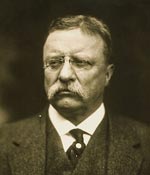
Theodore Roosevelt was the 26th President of the United States from 1901 to 1909. He was a driving figure of the Progressive Age, helping to reform the excesses and corruption of big business and a supporter of liberal reforms.
Roosevelt was a striking personality; keen on outdoor life, he was a great hunter and worked to set up the first American National Parks. He was also a literary figure, penning several books on military history. He was awarded the Nobel Peace Prize in 1906 for his successful efforts to end the Japanese-Russian war. At home, he expanded the US Navy and supported the US entry into the First World War.
His brother Elliot was father of first lady Eleanor Roosevelt, wife of Franklin Delano Roosevelt (a distant cousin of Theodore)
Early life
Theodore’s childhood was marked by ill health and nighttime bouts of asthma which give him a feeling of suffocation. However, despite ill health, he was vivacious and active. He found strenuous physical exercise helped him to overcome his asthma.
He admired his father, Theodore Roosevelt Rr. who was a businessman and philanthropist. His father encouraged his four children to cultivate fearlessness, good morals and honesty. Roosevelt credited his father and others for helping to overcome his natural timidity and weakness. He later wrote a book “Strenuous Life” (1901) explaining the benefits of hard physical exercise.
Religion
Roosevelt was nominally Christian. He was brought up in the Dutch Reformed Church and later switched to his wife’s Episcopalian Church. In political terms, he rarely invoked traditional religion, preferring instead the appeal of reason and goodwill of men.
Education
In his childhood, Roosevelt was home-schooled by tutors and parents. This allowed him to focus on areas of interest, such as geography, natural history and languages. Aged 17, he entered Harvard College, where he graduated with an A.B. He was a good student, despite deficiencies in the classics and mathematics. He was also a keen sportsman, partaking in boxing and rowing.
Whilst at Columbia High School, Roosevelt wrote the “Naval War of 1812” (1882). It was well received as a scholarly portrayal of America’s naval war. It illustrated Roosevelt’s multifarious capacities; it also illustrates his patriotic viewpoint of America’s destiny. The successful naval episode also encouraged him to build up America’s navy when he became President.
His father died whilst he was at Harvard; this was a great shock to Theodore because he had been so close. However, his passing gave him a comfortable legacy to be financially self-sufficient.
After his Harvard degree, he moved to Columbia Law School, but he didn’t enjoy the study of law, and he was attracted to political office.
Early political career
Despite his young age, Roosevelt was successful in becoming a Republican state assemblyman in New York beginning his political career.
As a state assemblyman in New York, he forged a reputation for being anti-corruption – exposing cases of corruption by wealthy individuals and judges. This helped raise his profile, and by the 1884 Presidential Campaign, he was a leading figure in the state Republican party.
However, after his reforming candidate lost the nomination to James G. Blaine and the shock of family members passing away, he temporarily retired from politics and moved to a ranch in Medora, North Dakota.
Family life
In 1880, aged 22, he married Alice Hathaway Lee. In 1884, Alice gave birth to their daughter Alice Lee Roosevelt, but his wife died shortly after. It was a devastating time for Roosevelt because his mother had died the previous day.
After temporary retirement from politics, he moved West, where he was active in leading the life of a frontiersman; he wrote three books on Ranch life and hunting. This included a best-selling book “The Winning of the West”, which celebrated America’s move into the Wild West.
After two years in the West, he returned to the East Coast and shortly after re-married, Edith Kermit Carow. The couple had five children.
Anti-corruption
In 1886, he stood as a Republican candidate for New York Mayor but finished 3rd behind the Democrats and United Labor Party. Again he retreated from frontline politics, but after the election of Benjamin Harrison to Presidency in 1888, Roosevelt was appointed to the United States Civil Service Commission. Roosevelt began attacking the system of political patronage for well-paid jobs (known as spoilsmen). Roosevelt’s high profile principled stance created a storm of publicity as the spoil system was deeply embedded in the political culture. It marked out Roosevelt as a reforming politician, with the capacity to take on vested interests.
“Far and away the best prize that life has to offer is the chance to work hard at work worth doing.”
– Theodore Roosevelt
New York City Police
In 1895, he was appointed a position on the board of the New York City Police Commissioners by William Lafayette Strong. Roosevelt began his characteristic high-minded reform to root out corruption and promote officers on meritocracy rather than political affiliation. Roosevelt took his job seriously; he was moved by a book by journalist Jacob Riis on the crime-ridden districts of New York. Roosevelt took a special interest in these crime infested areas and sought to improve the application of the law. He would even walk streets late at night to check police officers were fulfilling their duties. His reforms led to conflict with Tammany Hall and the police commissioners were later legislated out of existence.
Assistant Secretary of the Navy
After the 1896 Presidential election, Republican president William McKinley appointed Roosevelt to the assistant secretary of the Navy. In practice, Roosevelt acted as the real secretary of the Navy because he had so much more energy and dynamism than his nominal boss.
In 1898, Roosevelt was instrumental in mobilising the navy to engage with the Spanish navy currently in Cuba. Roosevelt advocated war more strongly than President McKinley. Roosevelt wanted European ejected from the Americas and wanted to support the Monroe doctrine.
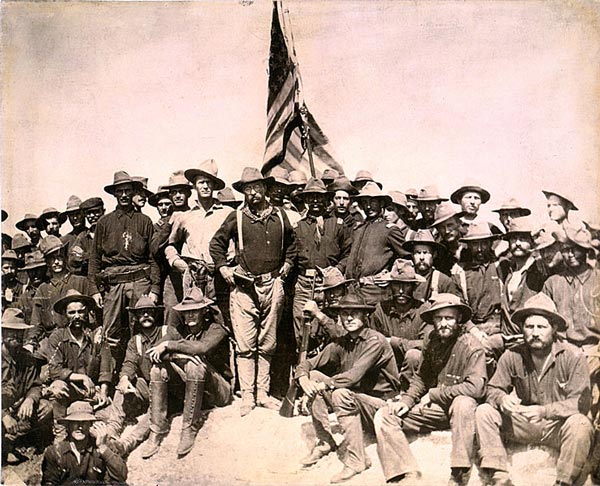
Theodore Roosevelt with his rough riders in San Juan
On the outbreak of war, Roosevelt resigned his position so that he could signup for active duty – forming the First US Volunteer Cavalry Regiment. Known as the Rough Riders, this newly formed regiment was a diverse mixture of volunteers. Roosevelt used his national guard training to teach his men elementary military skills. On 1 July 1898, Roosevelt led his men on a mission to capture Kettle Hill. He was the only man with a horse and rode frequently between gun positions. The campaign was a success and the regiment captured the position, despite advancing over open ground. Later he recalled this as “the great day of my life”
New York Mayor
In 1898, Roosevelt was narrowly elected to be governor of New York. He used his position to pursue greater regulation of companies, especially those who benefited from a state franchise. Roosevelt passed the Ford Franchise-Tax bill which taxed these companies who had support from the state. He successful trod a middle road position between free-market capitalism and socialist radicalism.
In 1900, Roosevelt’s political prominence meant he was chosen as vice-president for President McKinley. Despite major differences between the two, McKinley hoped Roosevelt would help capture the popular vote. Roosevelt’s tremendous energy and vociferous campaigning helped the Republicans to victory. He also campaigned on his war record and supported the annexation of the Philippines.
President of US
In September 1901, President McKinley was shot by a lone anarchist, dying later from his injuries. It meant Roosevelt became President just several months into the Presidential cycle.
As President, Roosevelt was more vigorous in supporting regulation of large companies (Trusts) which were considered to be exploiting their monopoly power. He brought 44 trusts, including the highly symbolic investigation of J. Rockefeller’s Standard Oil.
‘Square deal’
In 1902, he also supported the creation of the US Department of Commerce and Labour. After a coal strike broke out in May 1902, Roosevelt personally intervened to negotiate a solution. It involved concessions for both sides, including moderate pay increases for workers. Roosevelt stated he sought a fair ’square deal’ with both labour and capital. Towards the end of his presidency, he became more progressive, suggesting progressive income tax, tax on inherited wealth and ideas for the formation of a welfare state.
Roosevelt was active in other areas. He regulated railroads, investigated corruption and brought in new deals to outlaw dangerous chemicals in food. Roosevelt was one of the most activist Presidents of his generation. His zeal for reform and regulation extended to many areas, though Congress did not always support him, especially in his second term. He issued over 1,000 executive orders, a record number. By 1907, after the Financial Crisis, Congress was increasingly rebellious with conservative Republicans vetoing the president’s proposals.
Press briefings
Roosevelt’s success was partly attributable to his personal charisma and also a good relationship with the Press. He had daily briefings in the White House and instigated the first White House press briefings. Roosevelt was an instrument in placing the President at the forefront of the American political system. His prominence can be contrasted with the weaker presidencies of the late Nineteenth Century.
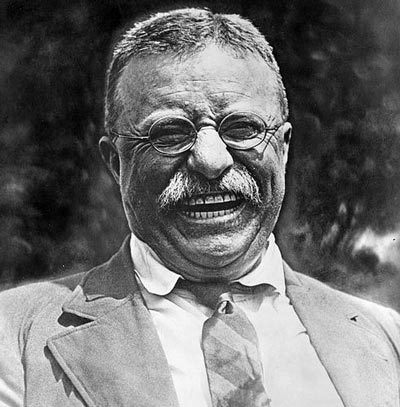
He hated the term ‘Teddy’ Roosevelt, though it was widely adopted by the press and popular culture. Those close to him used his preferred term – ‘colonel’.
Immigration
Roosevelt presided over a period of mass immigration. He stated that:
“we cannot have too much immigration of the right sort, and we should have none whatever of the wrong sort”
He reorganised the federal immigration depot at Ellis Island, which processed millions of people. He was a strong believer in the Americanisation of immigrants. He expected immigrants to revere only the American flag. He was critical of Irish and German immigrants for their hostile approach to the Allies in the First World War.
On the issue of race, Roosevelt appointed some African Americans to federal offices but did nothing to challenge existing policies in the south. He said slavery was a great sin
“a crime whose shortsighted folly was worse than its guilt” because it “brought hordes of African slaves, whose descendants now form immense populations in certain portions of the land”
Speaking on the question of race, Roosevelt considered America’s mixed race society a challenge, but in characteristic fashion argued for fair treatment
“I have not been able to think out any solution of the terrible problem offered by the presence of the Negro on this continent, but of one thing I am sure, and that is that inasmuch as he is here and can neither be killed nor driven away, the only wise and honorable and Christian thing to do is to treat each black man and each white man strictly on his merits as a man, giving him no more and no less than he shows himself worthy to have.”
However, towards the end of his presidency, he raised racial tensions by crusading against ‘race suicide’ – Roosevelt was concerned at the low birth rates amongst white voters, leading to a decline in the white share of the US population.
Conservation
During Roosevelt’s presidency, he enacted a series of policies to promote conservation. He created five new National parks and 18 new national monuments. He also created many new areas of preservation from forests to game reserves. As a great outdoors man, he considered it one of his greatest legacies.
Foreign Policy
As president, Roosevelt sought to further build up the US Navy. Despite being a vocal imperialist – supporting the annexation of the Philippines, he lost interest in Asia. His most significant project was perhaps the Panama Canal, which would be a vital trading route for sending goods from the East Coast to West coast by ship rather than cross-country. Roosevelt was criticised for paying too much money to the Panama Canal Company.
Roosevelt had considerable success in foreign policy – acting as an international mediator. He played a crucial role in mediating a solution to the Russian-Japanese war. For his role, he was awarded the Nobel Peace Prize in 1906. Under Roosevelt, relations with Great Britain were vastly improved, overcoming any remaining sources of conflict since the war of Independence.
In 1902-03, Roosevelt was instrumental in seeking an arbitration at the Hague between European powers and Venezuela
Roosevelt articulated his view of American foreign policy.
“Chronic wrongdoing or an impotence which results in a general loosening of the ties of civilized society, may in America, as elsewhere, ultimately require intervention by some civilized nation, and in the Western Hemisphere, the adherence of the United States to the Monroe doctrine may force the United States, however reluctantly, in flagrant cases of such wrongdoing or impotence, to the exercise of an international police power.”
After two terms as President, Roosevelt decided against running a third time, instead of supporting his preferred candidate William Taft. Roosevelt went on a tour of Europe and Africa, engaging in a large hunting expedition and meeting several European Heads of State. After building up the US Navy, he now gave a speech calling for limits on naval armaments. He also gave a speech to strengthen the Permanent Court of Arbitration and to support a new league of Peace for major countries.
1912 Progressive Party
By 1912, Taft had become a disappointment to Roosevelt. He felt Taft was too weak and conservative. So he stood for the Republican nominee again. However, when it was clear he would lose to Taft, he set up his own progressive party with like-minded Republican progressives. It was popularly known as the “Bull Moose Party”
Whilst campaigning for the presidency, Roosevelt was shot in the chest. He continued to give a speech for ninety minutes and the bullet resided in his chest for the rest of his life.
After finishing 2nd in the 1912 presidential election to Woodrow Wilson, Roosevelt went on an expedition to South America. During the trip, Roosevelt damaged his leg badly and contracted malaria. He would suffer ill health the remainder of his short life.
At the outbreak of the First World War, Roosevelt was vocal in condemning German aggression and supporting the Allies. He criticised Wilson’s neutrality, but until 1917, most Americans did not support Roosevelt’s position of entering the global conflict. In March 1918, Roosevelt lost his youngest son, shot down over German lines.
Legacy
Roosevelt is credited with reforming American political life and instituting liberal reform which counter-balanced the power of monopoly trusts. He was commemorated at Mount Rushmore with George Washington, Thomas Jefferson, and Abraham Lincoln, designed in 1927.
Citation: Pettinger, Tejvan. “Biography of Theodore Roosevelt”, Oxford, www.biographyonline.net, 8th January 2017. Last updated 24 Feb 2018.
The Rise of Theodore Roosevelt
The Rise of Theodore Roosevelt at Amazon
Related pages
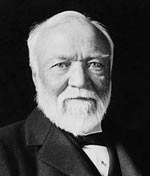 Famous people of the Gilded Age (1870-1900) – The great industrialists, such as J.D. Rockefeller and Andrew Carnegie who defined the Gilded Age. Plus other political and cultural figures who were famous in this era.
Famous people of the Gilded Age (1870-1900) – The great industrialists, such as J.D. Rockefeller and Andrew Carnegie who defined the Gilded Age. Plus other political and cultural figures who were famous in this era.
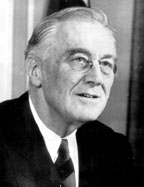
Famous Americans – Great Americans from the Founding Fathers to modern civil rights activists. Including presidents, authors, musicians, entrepreneurs and businessmen.


